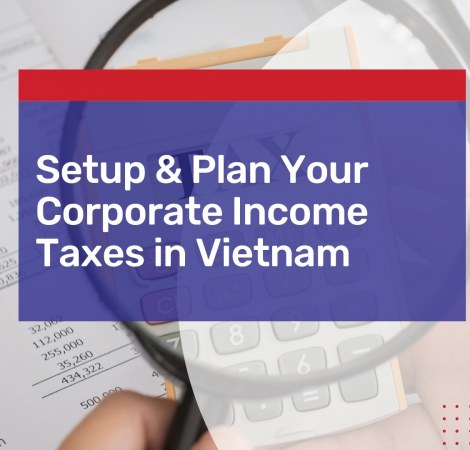Corporate income tax laws and compliance in Vietnam are often complex and time-consuming, and the regulations change quite frequently due to the fact that Vietnam is still developing its economy. Several lodgments may be required on an annual or quarterly basis based on your company’s industry, size and invoicing amount.
Read More About Cekindo’s Corporate Tax & Compliance Services for Foreign Firms
Corporate tax filing is not something you should do on your own and using a tax professional is extremely critical. Even if you engage a tax expert, as a business owner yourself, you will also need to know your corporate tax obligations in Vietnam and how they can affect your company’s bottom line.
Here are the steps you absolutely have to know when managing your corporate income tax processes in Vietnam.
Steps to Manage Your Corporate Income Tax (CIT) in Vietnam:
1. Identify the effective corporate income tax rates and deadlines.
In Vietnam, assessable income is used to calculate corporate income tax. The formula goes like this:
CIT Payable = Assessable Income x CIT Rate
And the assessable income is calculated with this formula:
Total Corporate Revenue – Deductible Corporate Expenses + Other Incomes – Carried Forward Losses
The CIT rate is different depending on the type of business: 20% for standard CIT (the most prevalent CIT for most industries) and a protected 32%-50% for oil and gas sectors, and other extractive industries. However, if your business operates in certain encouraged industries, however, tax incentives are available in the form of preferential tax rates, which we will detail below.
Filing deadline: 31st of March of the following year
READ MORE: The Complete Guide to Corporate Tax & Compliance Obligations in Vietnam
2. Know the corporate income tax incentives and take advantage of them.
There are different corporate tax incentives in Vietnam and the government decides if your company can take advantage of them based on the encouraged sectors, type of investment projects, locations, and project scales. Good news for SME businesses, the Vietnamese government will release tax incentives to SMEs that decrease SMEs’ primary tax rates. The tax incentives usually are 5%, 10%, or 15% according to the industries. The defined industries usually fall in the tech realm, like IT, Software Development and Blockchain technology.
Encouraged sectors for tax incentives include software development, information technology, high-tech companies, education, environmental protection, healthcare, aquatic and agricultural products processing, scientific research, infrastructure development, and renewable energy. To know what locations, project scales, preferential tax rates, and tax holidays and exemptions are applicable for corporate tax incentives, get in touch with a market entry consulting company whose tax consultants can help you navigate the country’s taxes.
3. Ensure continuous compliance with corporate income tax regulations with annual and quarterly tax planning.
Businesses have to calculate their provisional corporate income tax and submit it within 30 days after every quarter. As for the annual final corporate income tax return, known as tax finalization, companies need to calculate and remit any CIT payable balance within 90 days after each financial year. Should the company pay more CIT than what is due, refunds will be issued within six months.
For the 2021 tax year, the total provisional corporate income tax paid during the first three quarters must be at least 75% of the estimated amount for the whole year (specified in Decree 126/2020/ND-CP). If not paid in full, late payment interest will be assessed on the arrears from the third-quarter corporate income tax payment deadline until the date of settlement of the arrears.
However, a government Draft is due soon (announced in February 2022) to correct this Article due to the risk of over- or under-estimation of the annual payable amount. The modification will require businesses to pay at least 80% of all four quarters’ CIT by the fourth quarterly deadline mentioned above. After that, any remaining amount shall be paid by the annual finalization date.
All tax declarations and submissions that don’t meet the deadline are subject to late fees and penalties. Although the penalty for a late CIT declaration can vary greatly, late submission fines are generally calculated as 0.03% of the payable tax per day.
In Vietnam, January 1 to December 31 is the standard financial year. However, given the special conditions, companies in Vietnam are allowed to adopt their own financial year (based on their parent company or home country) which must be reported to the government.
NOTE: the deadline to file your corporate tax finalization is the 31st of March of the following calendar year.
4. Maximize tax-deductible expenses to manage corporate tax liability efficiently.
In general, necessary expenses for operating a business in Vietnam are basically all tax-deductible. These expenses are salaries, supplies and equipment, office and building rent, accounting and tax services, legal services, utility costs, etc. However, the expenses incurred must meet certain criteria to be eligible for deduction.
There are two main criteria for determining whether an expense can be incurred without tax. Firstly, there must be an official receipt or invoice of the transaction, which are to be indexed and processed by your accountants. Secondly, the expense must conform to the activities of your line of business and industry. For example, a SaaS company would likely not have an appropriate use for a stock warehouse.
RELATED: The Most Common Tax Infringements in Vietnam and How to Avoid Them
Outsource your Corporate Tax Processes
If you are a foreign company setting up in, or expanding to, Vietnam navigating the country’s tax rules, rates and deadlines are complicated. When you outsource your corporate tax needs to a third party with a long track record of specifically assisting foreign companies set up and pay their corporate taxes you can avoid the usual bureaucratic nightmare of such a young market like you will experience in a country like Vietnam.
